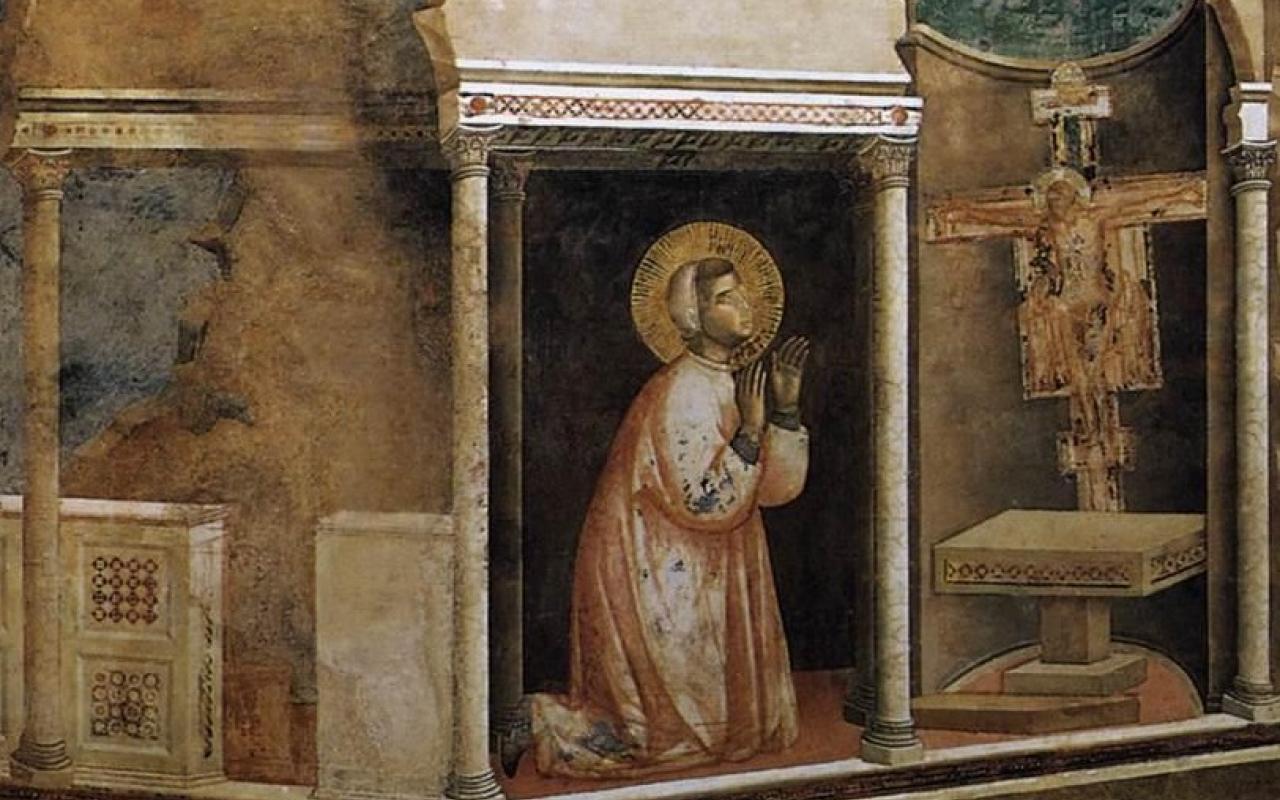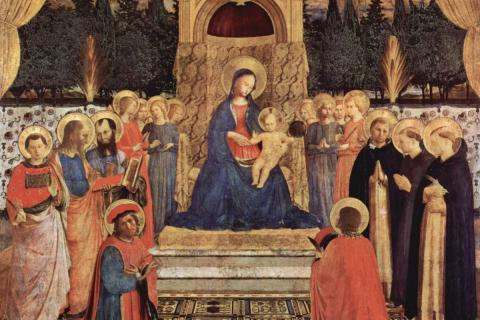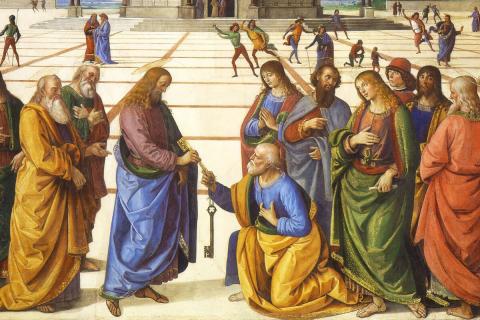
For many of us, the Mass can be more a chore than a source of strength and delight. That can leave us troubled and wondering what is wrong: Maybe God is boring? Maybe I am boring?
“The first and most important lesson which the liturgy has to teach is that the prayer of a corporate body must be sustained by thought” (Romano Guardini, The Spirit of the Liturgy).
Every Christian knows that we need to pray, to find a way to be in contact with God. Every Catholic knows that the Mass is the most important kind of prayer that there is. The Catholic author Flannery O’Connor once wrote: “The Eucharist is the center of existence for me; all the rest of life is expendable” (The Habit of Being). J.R.R. Tolkien, also a devout Catholic, wrote about the Eucharist in a letter to his son Michael who was fighting at the front in 1940:
The truth lies elsewhere. Setting aside the obvious problems that plague the liturgy when it is badly or unfaithfully celebrated in which case there is an objective difficulty that needs to be addressed, it can be said that the Mass is inevitably and even purposely uninteresting for those who don’t participate in it.
Participation
Consider other more mundane examples from life. At a large family gathering the adults sit around the table and talk after dinner, and once the food is gone the children find the conversation crushingly boring. “How long are you going to sit and talk? Let’s go play!” The conversation becomes interesting only when they reach a certain age and can begin to understand it. Conversely, there are few things more boring (for adults) than little-league sporting events or musical recitals; but the children find them highly interesting because they are participating in them. Reading an engrossing book can be highly engaging; watching someone else read a good book is, well, less so. Falling in love is among the more captivating experiences of life; lovers can become so enwrapped in each other that they seem to forget everything and everyone else and are anything but bored. On the other hand, few people are as uninteresting to others in a social situation as wide-eyed lovers.
All the activities just mentioned are interesting if we are doing the talking, playing, reading, or being in love. All lose interest when we are watching others do these things. The same is true of the Mass, only moreso, since what is going on there is far more significant; participation in the Mass goes beyond a merely human activity.
The Mass is emphatically not meant to be entertaining. It is not something to be watched. Entertainment is essentially a passive activity, a distraction and a diversion. As such it has its place, but it is not the stuff of life. For everything of real importance we want to be participants, not just onlookers. At a Mass there are no passive onlookers, no members of an audience. Everyone is busy and engaged in a work (from which the word “liturgy” derives). Church documents sometimes describe this engagement as “active participation.” By this they do not mean audience participation as at a rock concert: (“Everybody clap your hands!”) The word “participation” in this context is highly suggestive for Christians. It comes from the Greek word koinonia. It is used in the New Testament to describe the communion of the three persons of the Trinity, the union between Christ and the soul, and the unity shared by believers in the Holy Spirit. To actively participate in the Mass means to enter into communion with all that is happening there.
What then is happening at Mass? What are we participating in? Here are some aspects of our koinonia at Mass: We are sharing in the life of the Trinity, the inner being of God himself. We are partaking of heavenly worship, joining the angels and saints before God’s throne. We are reliving the death and resurrection of Christ, and are participating in the life of Christ himself as he continually offers himself for the salvation of the world. We are sharing the life of the Holy Spirit with all other Christians around the world and all our brothers and sisters who have ever lived, as the Mass mystically unites us across space and time. The whole body of Christ is worshipping, offering, being sacrificed, and being raised, as we participate in the central event of human history and of every individual life. There is nothing we do that is half so significant as the celebration of a Mass. That is why the Church calls it the source and the summit of the Christian life.
Communion
We often call attending Mass “going to communion,” a way of highlighting our participation. But we can sometimes encounter a problem at Mass if we are looking for the wrong kind of communion. Our highly sentimental culture mistakenly and often tragically suggests that emotional communion is the deepest and truest form of unity, and we can come to Mass looking for something that will stir our emotions and make us feel emotionally connected to what is going on.
The Mass purposely does not attempt to provide emotional communion. Instead it pursues communion of mind and will with Christ and with one another. This does not mean that the Mass will not or should not touch us emotionally. There is much at the Mass that may move us deeply, whether it be an articulation of truth, an expression of beauty in music or architecture, or moments of personal grace when we are touched by the Holy Spirit. But these are left to arise as they might; they are not demanded of the worshipper, and except on a few special occasions the Mass does not attempt to produce a particular emotive response. Why is that?
The Mass is the unique place where the human race finds its full unity. Everyone who belongs to Christ must be able to enter fully into the liturgy and participate in its action. Emotional communion is a good thing if it comes about authentically. But we all know how weak, passing, and fitful it is, and how impossible simply to command. Our deepest and most abiding experience of communion comes from unity of mind and of will. Emotions are secondary, and cannot sustain union if our minds and wills are not united. (Think of what happens to a marriage when a couple “falls out of love” and have nothing deeper upon which their union has been founded.) Insistence on a particular emotion, whether of joy or grief, excitement or reverence, would demand what many could not produce at a given moment, and would necessarily exclude those who were unable to summon up the requisite emotion.
The same liturgy needs to be available to everyone who is faithfully attending it: the old at the end of life and the young looking forward to life; those in happy circumstances and those experiencing anguishing tragedy; the young couple planning their wedding and the recently widowed woman mourning the loss of her husband. All need to be able to find communion together; all need to be able to actively participate in the same liturgy. That is why the Mass is purposely emotionally restrained. It will not allow any of the faithful to be excluded from its communion.
It helps to remember that at every Mass, Christ is the center, not us. It is true that we are not merely bystanders to his action; we participate in what he is doing through our mystical union with him. Still, the focus of the Mass is to look away from the self and to enter the action of Christ in the Holy Spirit. Anything at Mass that allows us enter that union more deeply and aids us in participating in what Christ is doing is a help. Anything that distracts us from it or gets in the way is a hindrance. For those attempting to enter communion with Christ through attentiveness and prayer, the constant effort to turn the Mass into an entertaining spectacle can be annoyingly distracting.
Mastering the Art
It is an excellent aspiration for us to aim at learning the fine art of praying the liturgy. Mastering that art begins by remembering, each time we walk into a church to attend Mass, that we are not entering a zone of entertainment where our inner spirit is passively waiting to see what will happen, as if we were going to a movie or a concert. We are coming to do a work, to offer praise and thanks to God, to prayerfully enter the action of the liturgy. That stance will require of us a steady and habitual attentiveness that runs against the grain, since our electronically-soaked world trains us to be the passive recipients of constant bits of audio and video information. At Mass we need to put all that aside, and settle ourselves to focus the active attention of our minds and wills on what is happening. We have attended Mass well, not when we come away passively inspired by what other people have been doing there (that’s an added grace), but when we can say that we have done our work well. We have prayed with reverence and attention, we have allowed the visible aspects of the ceremony to bring us to the invisible realities that underlay them, we have done our best to enter the great mystery taking place, and we have received the Bread of Life reverently and with faith.
If to this point we have sometimes found the Mass difficult or boring, we should not be dismayed. Everything worth doing, everything capable of maintaining our attention through the years, is hard until we master the art of it. Think of reading Shakespeare, or listening to Bach, or playing an instrument, or mastering a sport, or fashioning a marriage. Whatever is very easy to master soon becomes trivial and uninteresting.
To master the art of praying the liturgy is to find ourselves at the very center of reality. It is to be given a great gift that will only grow more and more gripping and meaningful as the years pass, and will keep us steadily on our true course during our pilgrim life on earth.
“All the good works in the world are not equal to the Holy Sacrifice of the Mass because they are the works of men; but the Mass is the work of God” (St. John Vianney).

